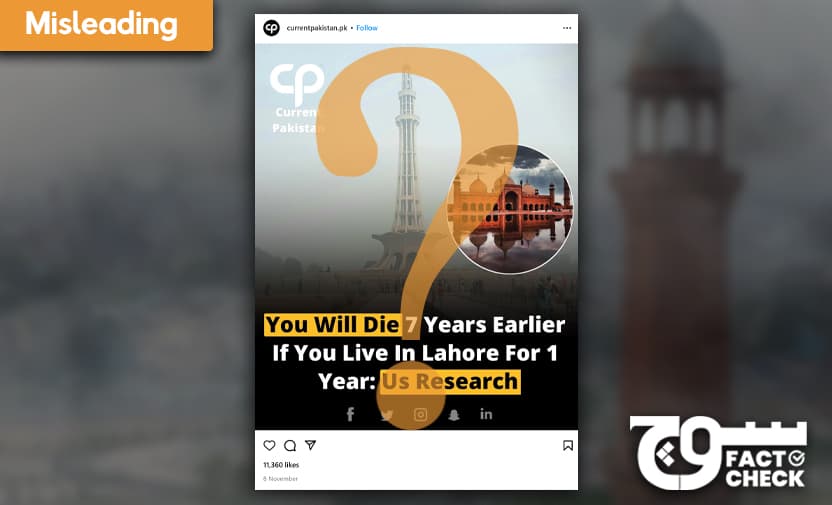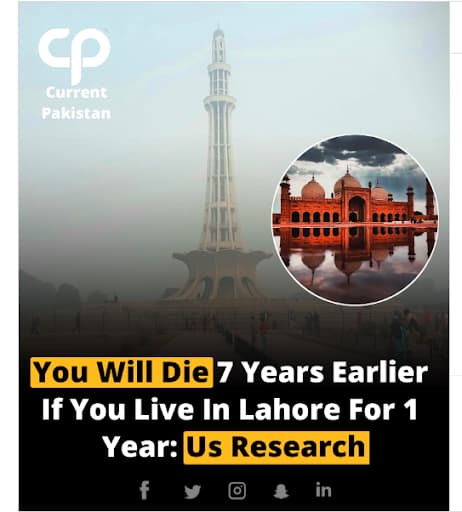
Claim: Several popular social media pages shared variations of the claim that said, according to a US study, “You will die seven years earlier if you live In Lahore for one year”.
The study referenced is the Air Quality Life Index’s (AQLI) fact sheet for Pakistan, which was published in 2023 and developed by the University of Chicago. Though the posts make it seem that the study is recent, it is actually based on the AQLI 2021 dataset. Therefore, its conclusions do not apply to 2024 when Lahore witnessed unprecedented levels of smog.
Further, the study does not state that living just one year in Lahore will reduce seven years of a person’s life. It states that “fine particulate air pollution shortens the average Pakistani resident’s life expectancy by 3.9 years, relative to what it would be if the World Health Organization (WHO) guideline of 5 µg/m3 was met.” It adds that in more densely polluted areas such as Lahore, residents would gain 7.5 years of life expectancy.
Smog emergency in Lahore
November 2024 brought unprecedented and dangerously high levels of smog to Lahore this year. The BBC reported that the city’s air quality index passed the 1000 mark while anything above 300 is considered hazardous.
Emergency measures were announced during the first and second week of November to protect residents from air pollution; schools were closed, parks and zoos were shut down, markets were instructed to shut down at 8 pm and remote work was encouraged.
Announcing these measures on 3 November 2024, news sites such as Al Jazeera and Dawn – citing the wire agency AFP – also quoted findings from the AQLI factsheet for Pakistan, which was published by the Energy Policy Institute at the University of Chicago (EPIC) on 28 August 2023.
Soch Fact Check investigated the viral claim and found that, while there is valid reason to be concerned about Lahore’s air quality, this specific claim is misleading and inaccurate.
Fact or Fiction?
The AQLI measures the impact of air pollution on life expectancy. Crucially, “the AQLI is rooted in research that quantifies the causal relationship between long-term human exposure to air pollution and life expectancy”.
Thus, the claim that living in Lahore for a year will reduce seven years of an individual’s life is false, since the AQLI measures long-term human exposure. It does not state the reduction in lifespan based on one year of living in Lahore. In fact, the study does not calculate life expectancy based on the number of years lived in any city of Pakistan at all, but only that of any city’s “residents”. The number of years lived in a city by a “resident” is not defined or stated in the fact sheet.
Dawar Butt, co-founder of Climate Action Pakistan, corroborated that the claim is false, stating that “The number [7 years of reduced life expectancy] is based on research that assumes persons living in the city long-term.”
A similar article published by Pakistan Today and Samaa News in November 2023 went even further to claim that smog reduces the average life of the people in Lahore by seven years, annually. The article read, “[The report] further says that the average life of people of the city is decreasing by seven years every year.” Pro Pakistani also made the same claim. The claim is highly inaccurate as the AQLI fact sheet does not state anywhere that the life expectancy of residents of Lahore will decrease annually.
Furthermore, the clickbait headlines and accompanying captions fail to accurately portray the study’s findings. The Currentpakistan.pk’s post, which gained 11,296 likes, reads:
“You will die seven years earlier if you live In Lahore for one year”

Source: currentpakistan.pk https://www.instagram.com/p/DCGu2fHCg54/?igsh=aHlrOGlxZmQyOWw2
The caption stated:
“A study from the United States says that living in Lahore, Pakistan, for just one year could shorten your life by up to seven years. This is because Lahore has a lot of air pollution, which is harmful to people’s health. The air is filled with pollution from cars, factories, and seasonal smog. This makes it dangerous for people who live or visit there and might make them think twice about staying for a long time.”
The posts also lack context and do not specify what “earlier” means. It fails to mention that the AQLI study measures the reduction in life expectancy of people living in Lahore by comparing it to how long they would ideally live in an environment that meets the WHO’s recommended levels of air pollution of 5 micrograms per cubic metre (µg/m³).
To assess the claim further, Soch Fact Check reached out to Syeda Hadika Jamshaid, a climate expert and the principal author of Pakistan’s National Clean Air Policy 2023.
She emphasised, “The claim that living in Lahore for a year would reduce your life expectancy by seven years is misleading. The study actually suggests that lifelong exposure to Lahore’s air pollution levels could lead to a reduction in life expectancy by seven years compared to someone living their entire life under the WHO’s recommended air quality levels. It does not mean that people in Lahore die 7 years earlier than someone in, e.g. Karachi or somewhere else in Pakistan.”
She added that it is important to recognise that these WHO guidelines are extremely stringent — just 5 micrograms per cubic meter (µg/m³), which many developed countries, including those in Europe, struggle to achieve in urban areas, with typical city levels ranging from 8 to 10 µg/m³.
“While Canada provides an example of achieving such low levels, this is far from the reality in Pakistan. There are real questions about the feasibility of achieving air pollution levels that the study claims would lead to 7 years longer lives in Lahore,” she stated.
“Like most countries, Pakistan is a long way from achieving the WHO guidelines and it is unrealistic to make these comparisons,” said Jamshaid.
Crucially, the posts make it seem like the study is recent and fail to mention that it was published in August 2023. It is not representative of the recent weather conditions in Lahore when the city experienced unprecedented levels of smog and air pollution in November 2024. The findings are based on AQLI’s 2021 dataset.
Lastly, the AQLI study focused on air pollution levels in all of Pakistan’s cities. Contrary to how the viral posts make it seem, the study was not only conducted on the pollution level in Lahore.
Therefore, Soch Fact Check concludes that viral posts on social media claiming, “You will die seven years earlier if you live In Lahore for one year” do not reflect the findings in the University of Chicago’s study accurately.
Virality
The claim was shared by many social media pages, some gathering up to 11,000 likes.
It was shared on Instagram here, here, here and here.
A keyword search using “You will die 7 years earlier Lahore” yielded many results on Facebook. The claim was shared by individual users as well as infotainment pages. Posts with the claim can be found here, here, here, and here.
Conclusion:
The University of Chicago’s study was published in 2023. It is not recent and does not state that living in Lahore for just a year will reduce seven years of a person’s life. Moreover, the AQLI is based on long-term exposure and does not limit the time of exposure to only a year. The posts also do not specify that people living in Lahore will die 7 years earlier than someone living their entire life under the WHO’s recommended air quality levels, not a person living in any other city in the world.
